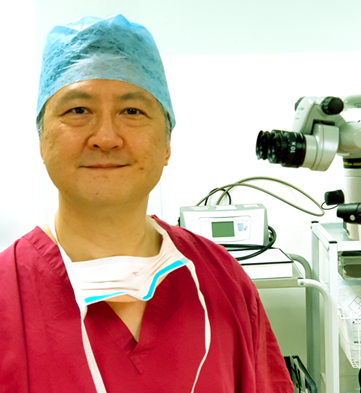Eye News caught up with Christopher Liu following his recent appointment by Her Majesty Queen Elizabeth II as an Officer of the Most Excellent Order of the British Empire for Services to Ophthalmology.
Christopher Liu OBE.
Congratulations on your recent OBE. Has the award altered your perspective in any way professionally and personally?
Thank you very much. It is a great honour to be appointed OBE and marks a huge point in my professional career. The recognition has given me an enormous boost in confidence and has furthered my ambition to continue making progress in ophthalmology. Furthermore, being recognised in this capacity will enable me to make considerable developments with the Sussex Eye Foundation. Over the next few years I’ll be working hard to raise funds to build a new centre for excellence for the whole of the South East which will advance ophthalmology and the provision of eye care in Sussex, adding much needed capacity.
Who has inspired you in your career and why? Who have been your heroes and mentors?
The reality is that so many people have inspired me throughout my career and I’m sure will continue to do so. I have been very fortunate to learn from prestigious eye surgeons like Tom Casey, Eric Arnott and Peter Wright, all of whom have shaped me into the surgeon I am today. Eric was particularly optimistic and instilled a great belief in me to take techniques further and strive towards perfection. As professionals, we cannot be at a standstill, we have to improve, and this is integral to how I will continue to further my professional career.
Elsewhere, I hugely admire Professor Roger Buckley who has made huge advancements in the contact lens and anterior eye areas. He was well ahead of his time, focussed on making a difference supported by medical advancements, research and innovation. These three pillars continue to play an integral role in my research and professional ambitions.
What has been the best piece of advice that you have received in your career? What advice would you offer to those following in your footsteps?
There are some truly exceptional doctors and surgeons and I have been lucky to glean advice from so many in my career to date. Peter Wright was hugely influential in the way I look after patients and taught me that whilst you should be kind and sympathetic towards patients, you must look objectively in order to deliver the best care. I believe that this advice has informed the way I work and has allowed me to make developments whilst not attaching myself to patients’ stories.
For those following in my footsteps there are two pieces of advice I would give.
Firstly, I would recommend that professionals develop a niche area of expertise in addition to general competence. Specialising in a clear area has allowed me to make a significant impact in ophthalmologic advancements which has been tremendously rewarding.
Secondly, when learning a new and difficult surgical technique, I would recommend visiting master surgeons in order to see the technique in action and build on their years of experience. When it came to DMEK, I learnt from Professor Friedrich Kruse in Germany and Professor Marc Muraine in France. In addition to this, I would also recommend practising in a wet lab environment and arranging for your first procedures to be supervised by an expert.
What are your professional and personal motivations?
Professionally, there is still a significant development I would like to make regarding bilateral same-day cataract surgery. As well as being more cost and time-efficient, there is no period of binocular imbalance, there is just one pre-assessment and one admission and there are significant learnings to build on from the first eye you operate on. The streamlining of this surgery could significantly improve patient safety and satisfaction as it already does with lid surgery, strabismus surgery, retinal detachment surgery and LASIK.
Personally, I am working hard to fundraise £25million in order to support the Sussex Eye Foundation (Registered Charity Number 1164025). We want to build a state-of-the-art eye facility for the South East that is a centre of excellence for the provision of eye care. It will support ophthalmic research and provide training opportunities for the next generation of consultant eye surgeons, ophthalmic nurses and ophthalmic technicians.
If you could make every ophthalmologist read one book or paper, what would it be and why?
While it may not sound like an obvious answer, I would recommend people to read the obituaries in The Daily Telegraph. It may sound morbid to begin with, but often they tell inspiring and thought-provoking stories that can help shape your view and help solve problems. They are stories of great people and provide insight into the hardship people have faced and the successes they have achieved.
What drew you to osteo-odonto-keratoprosthesis and how did you discover your own pioneering technique?
Even when I was a young doctor I always asked myself why we couldn’t use a small piece of plastic to restore sight in corneal blindness. While many people think it is a new technique, it in fact was being performed in the mid-sixties. Although only suitable for certain types of blindness, specifically patients who have severe and irreversible corneal damage, it has a high success rate.
The OOKP is a complex procedure which took me many years to master. I began working on it in the mid-nineties under the tutelage of Giancarlo Falcinelli, the surgeon who perfected it. It was a big commitment and I had to learn Italian in order to work with him but to be able to restore the sight of someone who has been blind for many years is an immense privilege.
The inaugural lecture of Professor Christopher Liu OBE is available to watch on Youtube: https://youtu.be/YRwU4k9_3ts
COMMENTS ARE WELCOME






